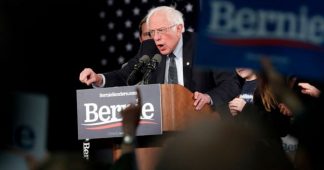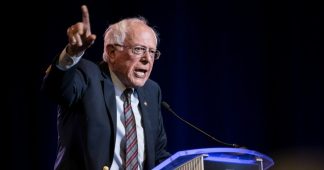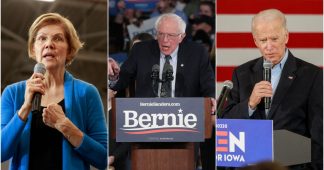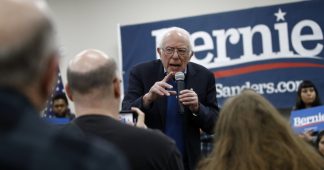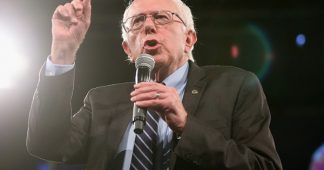By Patrick Martin
12 February 2020
Vermont Senator Bernie Sanders won the Democratic presidential primary in New Hampshire Tuesday. The vote counting showed a close race between the top three candidates, with Sanders at 26 percent, former South Bend, Indiana mayor Pete Buttigieg at 24 percent, and Senator Amy Klobuchar of Minnesota at 20 percent. Sanders led Buttigieg by a 4,000-vote margin, while Buttigieg was about 12,000 votes ahead of Klobuchar.
Voter turnout was up significantly compared to 2016, when Sanders won a nearly 2-1 victory over Hillary Clinton. Just under 250,000 people voted in 2016, while New Hampshire state officials said that nearly 300,000 people voted in 2020, an increase of nearly 20 percent. The total surpassed the previous record turnout of 265,000 in 2008, when Hillary Clinton defeated Barack Obama and John Edwards.
The state of New Hampshire, now under a Republican administration, changed its rules to make it harder for the large student population to vote, and the percentage of votes cast by young people under 30 fell significantly, holding down the total for Sanders, who won more than 50 percent in that category.
Exit polls showed significant differences in the demographic support for the three leading candidates. Sanders won a large plurality among men without a college education, a section of the working class that his campaign has targeted. As a result, Sanders carried the seven largest cities and towns in New Hampshire, including Manchester, the largest city, Nashua, the second largest, the state capital Concord, and the port city of Portsmouth.
Support for Buttigieg was concentrated in the suburbs and rural areas rather than the cities, and he carried many of the townships along the border with Massachusetts, home to thousands who commute to work in the Boston metropolitan area. Klobuchar’s campaign had its strongest support among women with a college education, particularly in upscale suburban areas like those the Democratic Party swept in winning control of the House of Representatives in 2018.
While Sanders carried Durham, the town that is home to the University of New Hampshire, the state’s largest college, Buttigieg won in Hanover, home to the far more expensive Ivy League school, Dartmouth University.
The primary results were disastrous for the two Democrats who were regarded as frontrunners for the nomination at various times during 2019, former Vice President Joe Biden and Senator Elizabeth Warren from neighboring Massachusetts. Warren received 9 percent of the vote and Biden only 8 percent. Biden, who followed up a fourth-place finish in Iowa with a fifth-place showing in New Hampshire, left the state in the afternoon and made a brief statement on the primary results at a rally in South Carolina, where his campaign may make its last stand on February 29.
New Hampshire’s 24 delegates to the Democratic national convention will be divided nine for Sanders, nine for Buttigieg and six for Klobuchar. Warren, Biden and the other candidates on the ballot failed to reach 15 percent of the vote and therefore failed to win any delegates. Three of the also-rans, businessman Andrew Yang, Senator Michael Bennet, and former Massachusetts Governor Deval Patrick, who only entered the race in November, indicated they would end their campaigns.
The campaign now turns to the Nevada caucuses on February 22, followed by the South Carolina primary a week later, and then “Super Tuesday” on March 3, when voters in 14 states will elect nearly 40 percent of the delegates to the nominating convention, and where billionaire Michael Bloomberg has already poured in $250 million in advertising to promote his own candidacy to supplant the political corpse of Biden as the standard-bearer of the “moderate” wing of the Democratic Party.
In an indication of the ferocity with which the Democratic Party establishment will react to Sanders’ emergence as the frontrunner for the nomination, the Culinary Workers Union in Nevada issued a flyer warning that Sanders would “end” their union health care benefits through his plan for “Medicare for all.” Speaking on MSNBC, Jon Ralston, editor of the Nevada Independent, said this represented the beginning of a “stop Bernie” movement in the state.
In their speeches to supporters on the night of the primary, the three leading candidates signaled their political posture going forward, with Klobuchar and Buttigieg vying with the fading Biden and the billionaire Bloomberg to become the face of the anti-Sanders campaign.
Klobuchar’s performance in last Friday’s debate was extravagantly hyped by the media, contributing to her surge in the polls from low single digits to 20 percent in a week. She sought to reprise some of these themes in her speech Tuesday night, calling for the building of a movement of “fired-up Democrats, independents and moderate Republicans,” claiming that “Donald Trump’s worst nightmare is that people in the middle … have someone to vote for in November.”
She dropped any attack on Sanders for his self-identification as a “democratic socialist” and instead talked out of the left side of her mouth, emphasizing her working-class origins. She cited her grandfather, a miner in Minnesota’s Iron Range, and her mother, a public-school teacher. As with the debate, media pundits portrayed her “victory” speech as a tour de force and sought to boost her campaign as a potential right-wing alternative to Sanders.
Buttigieg gave a speech full of vague platitudes, in the style of Barack Obama, along with suggestions of generational change, since he is 38, half the age of Biden or Sanders. He made no mention of the two factors that constitute his real credentials in the eyes of the ruling class: his role as a naval intelligence officer in Afghanistan, and his generally right-wing program, aligned with that of the Democratic Party establishment. Instead, echoing Sanders, he ended with a bit of “left” rhetoric, claiming that a Democratic president would “stop enabling corporate greed and start raising wages and empowering workers. One job ought to be enough.”
Sanders, who spoke last as the winner of the primary, began his speech with a guarantee that he would support the Democratic nominee—no matter who it might be, no matter how right wing, even (by implication) the billionaire Bloomberg. He expressed appreciation for the other candidates, naming Buttigieg, Klobuchar, Warren and Biden. “No matter who wins,” he said, “we are going to unite together and defeat the most dangerous president in the modern history of this country.”
This was a pledge to the Democratic Party establishment that Sanders will fully support the eventual nominee and a reply to a series of attacks by Hillary Clinton, claiming that he had sabotaged her campaign in 2016.
Sanders repeated his declarations that health care is a human right, that the wealthy should pay higher taxes, that colleges should be tuition-free, and a litany of other liberal slogans on climate change, criminal justice reform, immigration reform, gun control and women’s right to abortion. Supposedly, all these concerns could be addressed by replacing Trump in the White House with a Democrat.
While he pledged to take on a long list of greedy corporations and industries, Sanders was, as usual, completely silent about the capitalist system of which they are key elements. He made no reference to the reactionary budget plan made public by the Trump administration on Monday, or to Trump’s fascistic rally, held in the same city, Manchester, on Monday night.
There is no question that the vote for Sanders was an expression of a shift among working people and youth to the left. The first half hour of the Democratic debate Friday night, which had a wide audience in the state, consisted of Biden, Klobuchar and other candidates bemoaning the prospect that a “democratic socialist” might win the nomination, supposedly dooming the electoral prospects of every Democratic candidate in the November election.
Those who voted for Sanders clearly rejected this type of thinly disguised red-baiting. The New York Times quoted one young voter, employed at Dartmouth, saying, “In my world, there’s more support for the word socialist than billionaire.”
Forbes magazine—a bible of Wall Street—published this weekend a remarkable commentary under the headline, “Why Young Voters Are Embracing Bernie Sanders And Democratic Socialism.” It concluded, as a matter of obvious fact, “Younger people face the frightening realization that they may be the first generation to have a lower standard of living than their parents.”
The column went on to point out the impossible economic circumstances confronting the younger generation, including “a combination of crushing student loan debt, low-wage jobs and escalating home and rental costs.” It concluded, “In light of their situation, it’s not surprising that Bernie Sanders is surging in the polls and the idea of socialism is gaining traction among young people.”
Published at https://www.wsws.org/en/articles/2020/02/12/newh-f12.html
